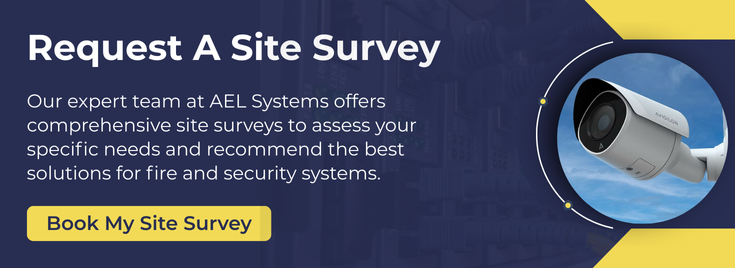How Commercial CCTV Systems Work To Protect Your Business
For UK businesses of all sizes, security is more than just locking the doors at night. A strong security strategy often includes a commercial CCTV system, offering not only a visual deterrent to criminals but also valuable tools for monitoring, evidence gathering and operational management.
This article explores how commercial CCTV systems work, the benefits they provide, the legal requirements to consider and how to get the most out of your investment.
The Role of CCTV In Business Security
A commercial CCTV camera system acts as both a proactive and reactive security tool. On the proactive side, the mere presence of cameras can deter opportunistic crime. On the reactive side, recorded footage can be reviewed to investigate incidents, provide evidence to police and support insurance claims.
But CCTV is not only about preventing theft. Many businesses use their systems to monitor health and safety compliance, improve customer service and keep an eye on operational efficiency.
How Commercial CCTV Systems Work
Modern commercial CCTV systems use a combination of cameras, recording devices, and network connections to provide clear, accessible surveillance. Here’s how they typically operate:
- Cameras: These can be fixed, dome, PTZ (pan-tilt-zoom), or thermal, depending on the environment. High-definition and low-light options ensure visibility in various conditions.
- Transmission: Footage is sent via cables or wirelessly to a recording and monitoring hub.
- Recording Devices: Network Video Recorders (NVRs) or Digital Video Recorders (DVRs) store the footage, often with remote access capabilities.
- Monitoring: Video can be viewed in real time onsite or remotely via secure apps or monitoring stations.
- Analytics: Advanced systems offer features like person and vehicle detection and classification, facial recognition and object tracking for smarter surveillance.
Benefits Of A Commercial CCTV Camera System
- Crime Deterrence: Criminals are far less likely to target a property with visible cameras.
- Evidence Collection: Clear video footage is invaluable in police investigations and legal disputes.
- Staff Safety: Cameras in car parks, entrances and work areas can help protect employees from threats.
- Operational Oversight: Managers can review workflow, customer interactions and safety compliance remotely.
- Insurance Support: Many insurers view CCTV as a risk-reduction measure, potentially lowering premiums.
Legal Compliance In The UK
If you’re using CCTV in your business, you must comply with the Data Protection Act 2018 and the UK GDPR. This means:
- Displaying clear signs that CCTV is in operation.
- Only collecting footage for specific, legitimate purposes.
- Storing footage securely and for no longer than necessary.
- Providing footage to individuals who request it under subject access rights.
Failing to meet these requirements can result in fines and reputational damage. It’s also wise to register your CCTV system with the Information Commissioner’s Office (ICO) if required.
Getting The Most Out Of Your CCTV System
- Position Cameras Strategically: Cover key entry points, high-value areas and blind spots.
- Choose the Right Camera Type: For example, PTZ cameras for wide areas, dome cameras for discreet coverage.
- Ensure Good Lighting: Even the best cameras struggle without adequate illumination.
- Regular Maintenance: Clean lenses, check connections and update firmware to avoid downtime.
- Integrate with Other Security Systems: Combine with alarms or access control for a layered defence.
A commercial CCTV system is a powerful tool for deterring crime, protecting staff and improving business operations. By understanding how commercial CCTV systems work and following UK legal requirements, you can ensure your investment delivers maximum security and compliance. Get in touch with our AEL Systems team to find out more.
- CCTV (24)
- Fire (22)
- Security (15)
- Alarm (9)
- Safety (6)
- Access Control (3)
- Burglary (3)
- Intruder (3)
- Data (2)
- Manchester (2)
- Police (2)
- School (2)
- ANPR (1)
- Access (1)
- Assessments (1)
- Avigilon (1)
- BAFE (1)
- Building (1)
- Car Park (1)
- Carbon (1)
- Charity (1)
- Covid19 (1)
- Detector (1)
- Electrical (1)
- Electronic (1)
- IP (1)
- Inspection (1)
- Insurance (1)
- Maintenance (1)
- Milestone (1)
- Mobile (1)
- NSI (1)
- NSI Gold (1)
- Part P (1)
- Regulations (1)
- SP203 (1)
- Smartphone (1)
- Smoke (1)
- Statistics (1)
- Theft (1)
- Thermal (1)
- Touchless (1)
- Training (1)
- vacancy (1)
- January 2026 (2)
- December 2025 (2)
- November 2025 (2)
- October 2025 (2)
- September 2025 (2)
- May 2024 (1)
- March 2024 (2)
- February 2024 (2)
- January 2024 (2)
- December 2023 (3)
- October 2023 (1)
- August 2023 (1)
- July 2023 (3)
- June 2023 (3)
- May 2023 (3)
- April 2023 (3)
- March 2023 (3)
- February 2023 (3)
- April 2021 (1)
- March 2021 (2)
- January 2021 (2)
- December 2019 (1)
- October 2019 (2)
- October 2016 (1)
- September 2016 (1)
- August 2016 (1)
- July 2016 (1)
- June 2016 (1)
- May 2016 (1)
- April 2016 (1)
- December 2013 (1)
- November 2013 (2)
- October 2013 (5)
- September 2013 (3)
- August 2013 (2)
- July 2013 (2)
- June 2013 (6)
- May 2013 (5)
- April 2013 (4)
- March 2013 (4)
- February 2013 (4)
Subscribe by email
You May Also Like
These Related Stories

What Is A Commercial Intruder Alarm System And How Does It Work?

Top 5 Commercial Security Systems in the UK Safeguarding Your Business


